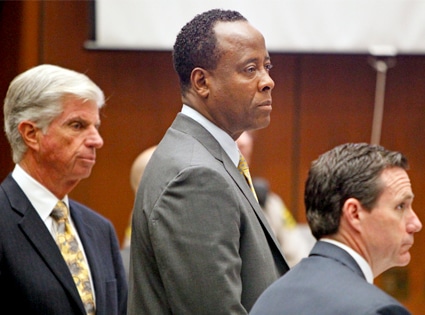 Al Seib-Pool/Getty Images
Al Seib-Pool/Getty ImagesUPDATE: 3:50 p.m.: Nguyen resumed her testimony after lunch. As a show of "good faith" for Murray, she said, doctors inserted a balloon pump into Jackson's aorta and attempted resuscitation. However, "he was lifeless," Nguyen recalled. The cardiologist also said that she had "never heard of propofol being used outside of a procedure room or ICU room." On cross, defense attorney Michael Flanagan argued that a dentist might use propol for certain procedures, and she fired back, "They certainly did not use propofol on me at my dentist's office."
UPDATE 11:45 a.m.: Dr. Thao Nguyen, a cardiologist working at the UCLA Medical Center on the day of Jackson's death, has taken the stand. She echoed earlier statements that Murray told doctors he only administered lorazepam, and nothing else, to Jackson, and said that the doctor "did not have any concept of time." She asked him for times and time intervals on several occasions to determine when medication was administered and when Jackson was found, and Murray was unable to answer. The proceedings broke at noon and Nguyen will resume her testimony at 1:30 p.m.
UPDATE 11:30 a.m.: Sprint Nextel rep Jeff Strohm is now on the stand to testify further about Murray's cell phone records the morning of June 25, 2009. He testifies that with several of the shorter calls placed to Murray's phone that morning, due to their short duration, it's impossible to tell whether Murray actually picked up the phone or whether he simply let the calls ring.
UPDATE 10:45 a.m.: AT&T rep Edward Dixon has taken the stand to testify about Murray's cell phone records the day of Michael's death. He confirms that minute-long cell phone calls were placed from his phone at 12:12 p.m. and 12:15 p.m., and that calls were placed from his cell again at 3:38 p.m., lasting two minutes, and 4:31 p.m., 4:32 p.m. and 5:02 p.m., lasting one minute each.
UPDATE 10:20 a.m.: Under cross-examination, Cooper said that while Murray never mentioned that he administered propofol, it likely wouldn't have mattered even if he had, as Jackson was "clinically dead" by the time he got to the hospital and at no time did she detect a pulse before calling his death at 2:26 p.m. "Mr. Jackson died long before he became a patient I was personally responsible for," she said. She is dismissed, and court has recessed for a 15-minute morning break.
UPDATE 10:05 a.m.: Cooper testifies that she has and would never perform a procedural sedation (say, by using propofol) in a room that does not have constant monitoring, that could precisely monitor the dosage flowing into the patients' body or if she was not in a hospital setting. She also said that the most common problem associated with oversedation is respiratory failure. She denied that one could tell this problem developed simply by looking at a patient, and restated the importance of performing it in a proper facility.
UPDATE 9:15 a.m.: Cooper is on the stand getting grilled by the defense on why and when she wanted to call time of death on Jackson. "My assessment when he arrived was that he was clinically dead...the resuscitation efforts would likely be futile. I felt comfortable pronouncing him."
The good news: we no longer need to tally up progress in Conrad Murray's involuntary manslaughter trial in days. We've made it to weeks.
Because today marks the start of the second week of the trial, which all told is expected to run for a total of five weeks. Michael Jackson's family is, as always, expected to turn up for the proceedings, which today will continue the testimony of Richelle Cooper, the emergency room doctor at UCLA Medical Center who gave paramedics permission to pronounce Michael dead in the bedroom of his home.
She testified Friday that Jackson showed signs of "a dying heart" and was "clinically dead" when he came into the E.R.
The sure-to-be dramatic courtroom action resumes at 8:45 a.m. PT sharp, and we'll be streaming live all day long from inside the courthouse.
(Originally published on Oct. 3, 2011 at 8:50 a.m. PT)